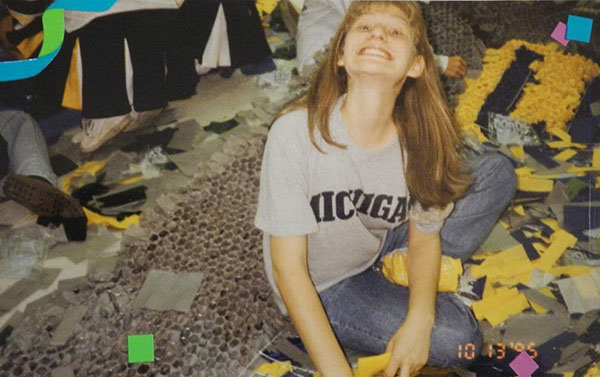South through the decades: staff contrast past, present

Photos courtesy of Katie Hoover & Deborah Stein
POMP AND PLAY: On the left, English teacher Katie Hoover leaps high into the air to block the ball. On the right, science teacher Deborah Stein works on float design for the South homecoming parade. Hoover and Stein were graduates of South in 2000 and 1995, respectively.
October 2, 2015
With every decade comes defining qualities. The 1970s brought an open mind. The 1980s pioneered the alternative movement. The 1990s was home to grunge, and the 2000s delivered technological innovation, according to four different teachers that graduated from four different decades. They have seen many trends come and go while living through the evolution of South.
From Titan Nation to the annual homecoming parade, South has a history of school spirit. Science teacher Deborah Stein graduated from South in 1997. Although South is all about the spirit, Stein says there are certain traditions she loved that she wishes were still around.
“Everybody went to float construction for homecoming,” Stein said. “You would go to people’s houses, and they wouldn’t necessarily be your friends, it would just be a person from your class who was hosting the party. It didn’t matter who you were friends with or what you were involved with, everybody just participated in float construction.”
Matthew Whipple, social studies teacher, graduated from South in 1984, and also taught Stein during her time at South. Like Stein, Whipple explained how some of his most vivid memories of the time as a student at South had to do with school pride, specifically nights when the football team took on rival Glenbrook North. Whipple said that when he was in high school, the games were often controversial, because students would wave Confederate flags at the game, symbolizing that “South will rise,” rather than being an intentional act of racism.
“The early ‘80s [were] a time when at Glenbrook South-Glenbrook North football games, they waved the Confederate flag [to symbolize that Glenbrook South was in the southern part of Glenview-Northbrook],” Whipple said. “By the time I came back to teach in ‘92, we had abandoned that strategy. People had no context. When I went to school here there were eight African-American students. There wasn’t a dialogue about race and ethnicity.”
In addition to the change in spirit throughout the school, several teachers have noticed that the current development in the use of technology has drastically affected the way South operates. Whipple explained how throughout his high school years at South, both as a student and now as a teacher, there were many technological advancements.
“When I was here I still typed [out] papers on a manual typewriter,” Whipple said. “I got to the point at the very end of high school when the very first Mac [computer] came out. There was no Internet and no email communication. In the mid 1980s they came out with the bag phone; the thing was huge. The phenomenon of communication has radically changed.”
In stark contrast to South’s current regulations, Whipple also notes that teachers would oftentimes smoke cigarettes while in their offices.
“When I was in high school [1980-1984] teachers could smoke in their offices,” Whipple said. “If you went to visit your teacher, they might actually be smoking when you walk in the door. Whenever I’d open the door to the English office, a cloud of smoke would come out.”
Stein believes that students are not as social as they were when she was a student. According to Stein, instead of students conversing in the hallways face-to-face, they are often looking down at their cell phones while walking.
“Kids talked more,” Stein said. “You walk in the hallways now and everyone is on their phone. There used to be a bench outside of the cafeteria, and it was supposed to be where juniors and seniors were allowed to sit. People would just hang out and talk to each other. You never saw kids walking around with their headphones on listening to music; everybody just talked more.”
Having been a student at South in the mid to late 1970s, John Sullivan, social studies teacher, has noticed a shift in the overall mentality of students. He believes students place intense pressure on themselves regarding grades as a result of competition within the school.
“There wasn’t this sense of anxiety or fear that you weren’t going to get into a school,” Sullivan said. “You took the ACT once. It’s not that way anymore, and it has taken some of the fun out of high school years. We could be goofy, try new things, and not think those decisions were going to have such a great impact on the rest of our lives.”
English teacher Katie Hoover graduated from South in the year 2000. Hoover says her class could not have been prouder to be the millennial class, because they were the first class of the new century. According to Hoover, she is thrilled that South has always upheld the values that have been the fabric of the South community.
“What makes Glenbrook South really special is that we are able to hold onto the traditions of respect, loyalty, hard work and of service,” Hoover said. “I think we have been holding onto them, refining them and improving them as new faculty and staff come in. At the same time, South still allows for […] new [interests] of our student population.”


